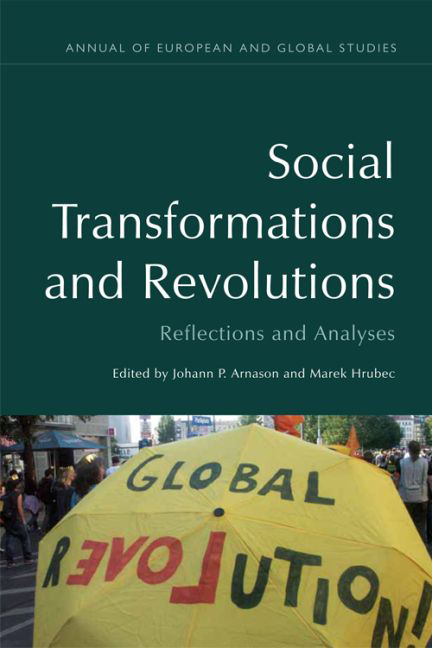Book contents
- Frontmatter
- Contents
- 1 Introduction
- 2 A Trialogue on Revolution and Transformation
- 3 Revolutions, Transformations, Civilisations: Prolegomena to a Paradigm Reorientation
- 4 The Transformation of Capitalism and the Limits of Democracy
- 5 From Civilisational Crisis to Revolutionary Transformation?
- 6 Environmental Crisis and Political Revolutions
- 7 Communists and Social Democrats in the Hungarian Soviet Republic
- 8 Can Political Participation Become Dangerous for Democracy? Participatory Experiences in Brazil and the Reactions Against Them
- 9 Hidden Revolutionary Processes in 1990s India?
- 10 Matching Reforms of Political and Economic Systems of China
- Notes on the Contributors
- Index
1 - Introduction
Published online by Cambridge University Press: 15 September 2017
- Frontmatter
- Contents
- 1 Introduction
- 2 A Trialogue on Revolution and Transformation
- 3 Revolutions, Transformations, Civilisations: Prolegomena to a Paradigm Reorientation
- 4 The Transformation of Capitalism and the Limits of Democracy
- 5 From Civilisational Crisis to Revolutionary Transformation?
- 6 Environmental Crisis and Political Revolutions
- 7 Communists and Social Democrats in the Hungarian Soviet Republic
- 8 Can Political Participation Become Dangerous for Democracy? Participatory Experiences in Brazil and the Reactions Against Them
- 9 Hidden Revolutionary Processes in 1990s India?
- 10 Matching Reforms of Political and Economic Systems of China
- Notes on the Contributors
- Index
Summary
PROBLEMS OF SOCIAL Revolutions and/or transformations belong to the classical agenda of social inquiry, as well as to the most prominent real and potential challenges encountered by contemporary societies. Among revolutionary events of the last decades, particular attention has been drawn to the changes that unfolded at the turn of the 1990s and brought the supposedly bipolar (in fact incipiently multipolar) world to an end. The downfall of East Central European Communist regimes in 1989 and of the Soviet Union in 1991 marked the beginning of a new era, originally characterised on the one hand by the relaxation of international tensions and on the other by the ascendancy of Western unilateralism.
The twenty-fifth anniversary of the Soviet collapse prompts the authors of this book to reflect on revolutions and transformations, both from a long-term historical perspective and with regard to the post-Communist scene. The social changes unfolding in Eastern and Central Europe are not only epoch-making historical turns; their economic, social and political aspects, often confusing and unexpected, have also raised new questions and triggered debates about fundamental theoretical issues. Moreover, they have had a significant impact on developments elsewhere in the world, in both Western and developing countries.
In another context, military actions of the United States after the terrorist attacks on 11 September 2001 have also had a major and controversial impact on the global arena. More recently, the economic crisis that began in 2007–8 can be seen as a historical watershed; it caused a series of breakdowns and provoked demands for social and political transformation, so far unfulfilled. The wave of protests and mostly abortive revolutions, known to optimists as the Arab Spring, is certainly not unconnected to crisis dynamics in the centres of the world economy, but it also reflects regional trends of a specific kind. Finally, internal and external transformations linked to the rise of new powers (such as the BRICS group, to which we could add Turkey, Indonesia and Mexico, and possibly others) are altering the patterns of international and global relations.
All these processes have unfolded within the framework of unchallenged global capitalism, whose reproduction on an expanding scale involved multiple economic, political, ecological and civilisational transformations.
- Type
- Chapter
- Information
- Social Transformations and RevolutionsReflections and Analyses, pp. 1 - 5Publisher: Edinburgh University PressPrint publication year: 2016

